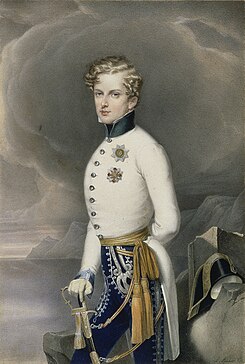Duke of Reichstadt
| Napoleon II | |||||
|---|---|---|---|---|---|
| Duke of Reichstadt | |||||

Portrait by Leopold Bucher
|
|||||
| Emperor of the French (disputed) | |||||
| Tenure | 22 June 1815 – 7 July 1815 (Non proclaimed) |
||||
| Predecessor | Emperor Napoleon I | ||||
| Successor |
King Louis XVIII as King of France and Navarre |
||||
| King of Rome | |||||
| Tenure | 20 March 1811 – 11 April 1814 | ||||
| Born |
20 March 1811 Tuileries Palace, Paris, First French Empire |
||||
| Died | 22 July 1832 (aged 21) Schönbrunn Palace, Vienna, Empire of Austria |
||||
| Burial | Les Invalides, Paris, France | ||||
|
|||||
| House | Bonaparte | ||||
| Father | Napoleon I Emperor of France | ||||
| Mother | Archduchess Marie Louise, Duchess of Parma | ||||
| Religion | Roman Catholicism | ||||
| Full name | |
|---|---|
| French: Napoléon François Charles Joseph Bonaparte |
Napoléon François Charles Joseph Bonaparte (20 March 1811 – 22 July 1832), Prince Imperial, King of Rome, known in the Austrian court as Franz from 1814 onward, Duke of Reichstadt from 1818, was the son of Napoleon I, Emperor of the French, and his second wife, Archduchess Marie Louise of Austria.
By Title III, article 9 of the French Constitution of the time, he was Prince Imperial, but he was also known from birth as the King of Rome, which Napoleon I declared was the courtesy title of the heir apparent. His nickname of L'Aiglon ("the Eaglet") was awarded posthumously and was popularized by the Edmond Rostand play, L'Aiglon.
When Napoleon I abdicated on 4 April 1814, he named his son as Emperor. However, the coalition partners that had defeated him refused to acknowledge his son as successor; thus Napoleon I was forced to abdicate unconditionally a number of days later. Although Napoleon II never actually ruled France, he was briefly the titular Emperor of the French in 1815 after the fall of his father. When his cousin Louis-Napoléon Bonaparte became the next emperor by founding the Second French Empire in 1852, he called himself Napoleon III to acknowledge Napoleon II and his brief reign.
Napoleon was born on 20 March 1811 at the Tuileries Palace, son of Napoleon I and Empress Marie Louise. On the same day he was ondoyed (a traditional French ceremony which is considered a preliminary, brief baptism) by Joseph Fesch with his full name of Napoleon François Charles Joseph. The baptism, inspired by the baptismal ceremony of Louis, Grand Dauphin of France, was held on 9 June 1811 in the Notre Dame de Paris cathedral.Karl Philipp, Prince of Schwarzenberg, Austrian ambassador to France, wrote of the baptism:
...
Wikipedia
